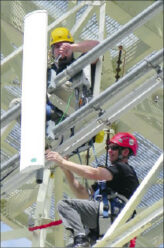Wireless tower contractor sees demand climb
Northwest Installation expects potential surge as 4G blossoms

A fledgling Liberty Lake cell-tower company launched by a former Marine has enjoyed rapid growth during its first three years in business and is hoping to make another leap forward this year.
The company, Northwest Installation & Commissioning LLC, realized $100,000 in sales in 2007, its first year in business. By 2009, its annual sales had shot up to $1.2 million.
Cody Flavel, the ex-Marine who founded the wireless subcontracting company and operates it out of his Liberty Lake home, attributes the company's growth to securing a large contract within the industry, which required that he obtain $5 million in insurance for his tower climbers, and to putting in "100-hour work weeks for months on end." He hopes to land another large contract this year and bring his 2010 sales up to $2 million.
Flavel says there's a lull in the industry right now, but he expects another spurt of growth as broadband Internet phone service, the next generation of telecommunications technology, becomes more widely available.
About 80 percent of Northwest Installation's work so far has been what are called "audits" of wireless towers. To do such an audit, Flavel or one of his employees goes to a transmission tower and collects data about the tower's equipment, such as what type of antenna it has, how the antenna is positioned, how many radios are located inside the box at the base of the tower, and whether the tower is connected to copper transmission wires or fiber-optic cables.
The data are then sent to the equipment's owner, such as AT&T Wireless, and an engineer for the wireless carrier determines how best to implement new technology on that tower. Flavel doesn't know why the information gap on cell tower equipment occurred, but says cellular phone companies now are building databases with that information, and that's been keeping Northwest Installation growing.
Other work the company has done includes installing new equipment on towers; "commissioning" towers, which means getting all new equipment up and running on a tower and then testing it; and providing tower technicians to larger wireless communications companies.
The next big push for Northwest Installation will be installing equipment for wireless carriers that provide broadband service to cellular phones, Flavel says. This new technology, called fourth generation, or 4G, will allow phones to operate more like a computer with high-speed Internet access and to run programs like Skype that transmit video during a conversation, he says.
The infrastructure for the new technology has been deployed by Sprint Nextel in California and Seattle, and soon will be deployed in Tacoma, Flavel says. He has yet to see a phone that operates with the new technology, but knows they are being developed. He wants his company to be ready to do 4G installation work when it's available.
"I'm putting numbers together right now to start doing that," Flavel says. "It's about to kick off any day now."
Clearwire Corp., a Kirkland, Wash.-based wireless broadband provider working in association with Sprint Nextel, said early this month that it was conducting tests on its new network to determine how fast the broadband wireless phones could operate, and to examine potential future technology combinations that might provide additional benefits. A customer support person for Clearwire says the company hopes to operate nationwide within a year, but doesn't provide telecommunications service in the Spokane area yet.
Flavel says he has heard from sources in the telecommunications industry that to keep up with demand, a large wireless provider such as AT&T Wireless needs to double its capacity to process calls and data every six months. "They need to grow quickly, and I've heard they're spending a lot of money to do that," he says.
Flavel's interest in wireless telecommunications began with his work as a field radio operator in the Marines from 1993 to 1997. Following his military service, he earned a bachelor's degree in telecommunications management and worked for telecommunications companies as a technician and then as a construction manager for network deployment.
In 2007, he felt he knew enough to go into business for himself, so he says he came home to Liberty Lake, took out a home-equity loan on a condo he owns at Schweitzer Mountain Resort, near Sandpoint, and launched his company. Depending on how many contracts the company has, it employs from five to 20 people.
Flavel says he has hired tower climbers from his contacts within the industry, and from the Apprenticeship and Journeyman Training Center at Spokane Community College. He's also hired a couple of competitive rock climbers who were ready for a career change. In order to work for the company, a technician must "be willing to work hard, work on the road, and not be afraid of heights," Flavel says.
Flavel says his industry is "very dangerous," and that "a lot of people are dying from falls." That's why he needs to carry a large insurance policy to get contracts with major telecommunications providers. One of Northwest Installation's employees is certified in fall protection safety training, and he trains all of the company's new hires in proper climbing technique, fall prevention, first aid and CPR.
Now that Northwest Installation is doing well, Flavel says he hasn't been putting in 100-hour weeks any more. He's glad to be able to water ski, snow ski, and spend time with his girlfriend, he says. Through Washington State University Spokane's distance learning program, he also is studying critical chain project management, which he hopes will reduce project time and more accurately predict project completion time for the company's clients.
Related Articles

_c.webp?t=1763626051)

_web.webp?t=1764835652)
